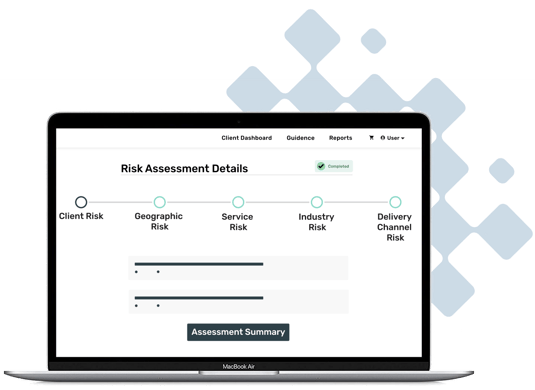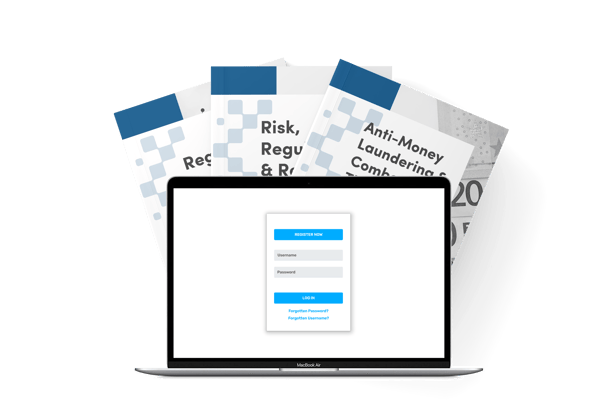Your firm has a legal obligation to prove its Anti-Money Laundering compliance. Make it easy using our simple online platform.


AML Compliance for Solicitors and Lawyers
AML HQ's all-in-one solution for legal professionals was created in line with guidance from the official competent authorities to solve the challenges that solicitors and legal professionals face in complying with ongoing Anti-Money Laundering regulations.
AML HQ reduces onboarding times and provides your clients with a modern, secure and professional impression of your firm. All client due diligence checks and evidence are automatically recorded in a GDPR-compliant process and can be efficiently retrieved on-demand to support audits and regulatory visits.
Instead of spending hours meticulously researching and documenting processes, you can put those hours into growing your business. Our service reduces your risk of exposure to money laundering by guiding your staff through efficient processes such as initial risk assessments and client due diligence checks.
How we help Legal Professionals
Onboard Clients
We offer end-to-end management of KYC onboarding processes for new customers and existing clients. This includes collecting data, identifying documents, and categorising the customer as high or low risk for the purposes of standard or enhanced AML screening.
Client Due Diligence for Legal Practices
We can identify and verify your clients electronically using our online tools, so you always know who you are doing business with, from private to corporate clients we have you covered.
Maximise Billable Hours
Ensure staff are not bogged down with administrative burdens, our system allows you to streamline your AML process so your firm can save time and money while growing its customer base.
Regulatory Compliance and KYC in a Single System
Our centralised solution provides a single, secure place to review and store your client data while meeting compliance requirements, with no technical integration needed.
Meet On-going Anti-Money Laundering Obligations
AML HQ's platform is continuously updated to be in line with the latest legislation and guidance supporting your law firm to meet continual KYC obligations easily, quickly, and cost-effectively.
Evidence of your Compliance Process
Our online platform allows you to onboard clients with a risk-based approach that automatically creates the records and reports, to demonstrate due process and compliance.
Compliance Through Convenience
Creating a risk assessment is essential, but it doesn’t have to be difficult.
Anti-money laundering risk assessments are an essential part of preventing financial crimes and following regulatory mandates. Every practice must adopt a risk-based approach to AML, including having an AML risk assessment to keep your firm safe from money laundering and counter-terrorist financing.
AML HQ can quickly help you construct an effective risk assessment methodology that is cost-efficient and easy to implement. Our online risk assessment is designed to bring together every question you need in one easily editable document. The questions address risks collated from multiple sources.
A risk assessment helps to;
-
Assess the level of risk associated with their firm
-
Use a risk-based approach to prevent money laundering
-
Create robust policies, procedures, and controls that actively reduce the risk of financial crime
-
Make informed decisions about clients
-
Evaluate risk reduction measures
-
Identify transactions and relationships that involve an at-risk or sanctioned party
Tailored policies and procedures to suit your firm
Firms must establish and maintain a framework of policy controls and procedures to mitigate and manage the risks of money laundering. To identify, monitor, evaluate and manage the risks, the framework should be proportionate to the size and nature of the business.
AML HQ provides you with a full framework of policies, controls, and procedures that can be further tailored to your firms’ requirements. We will notify you with updated guidance from competent authorities across the UK and Ireland.
Our policies, controls and procedures cover every area of anti-money laundering compliance your firm might need to consider;
-
A risk-based approach, risk assessment, and management
-
Client due diligence
-
Record keeping
-
Internal control
-
Ongoing monitoring
-
Reporting procedures
-
Compliance management
Fast, simple and secure client due diligence
The purpose of client due diligence is to know and understand a client’s identity and business activities so that money laundering risk can be properly managed. Effective CDD, is therefore, a key AML defense. By knowing the identity of a client, including who owns and controls it, a business not only fulfills its legal and regulatory requirements, it equips itself to make informed decisions about the client’s standing and risk.
Our solution helps you onboard clients quickly and securely by using a combination of digital, physical, and biometric checks.
Our client due diligence process can be tailored to suit your needs and includes;
-
Official company information checks
-
Beneficial ownership verification
-
Document proof and data extraction
-
Biometric facial recognition
-
Liveness check includes video and motion capture
-
Configurable sanctions and PEP & screening
Compliant by design, make your audits as painless as possible
Audits often take up valuable resources within firms which end up costing time and money. AML HQ achieves compliance through convenience. Our automated processes help you work more efficiently whilst reducing friction points for you and your clients.
At any time you can run an instant firm-wide anti-money laundering compliance report. This is particularly useful to inform management on risk, allocate team resources or prepare for impending audits. At the touch of a button, our audit functionality allows you to produce comprehensive auditor extracts to evidence and demonstrate compliance.
Our tailored processes help you;
-
Assess compliance and achieve compliance assurance
-
Identify compliance gaps
-
Ensure CDD documentation and evidence are readily available for inspection
-
Review and respond to changes in your practice and legislation
CPD content tailored to fit the needs of your company's requirements

All professionals should receive continuing professional development (CPD) appropriate to their role. AML HQ provides you with the ability to track your staff’s training schedules and identify if there are any training gaps.
AML HQ provides access to a series of online CPD training webinar videos, on a variety of essential subjects and topics, available for purchase for accountants, solicitors or designated persons in a compliance role
Each CPD course gives you access to;
-
Virtual CPD conferences courses and webinars
-
Download all supplementary training documentation
-
Regular review and update
-
Documented record of all training maintained
Creating a risk assessment is essential, but it doesn’t have to be difficult.
Anti-money laundering risk assessments are an essential part of preventing financial crimes and following regulatory mandates. Every practice must adopt a risk-based approach to AML, including having an AML risk assessment to keep your firm safe from money laundering and counter-terrorist financing.
AML HQ can quickly help you construct an effective risk assessment methodology that is cost-efficient and easy to implement. Our online risk assessment is designed to bring together every question you need in one easily editable document. The questions address risks collated from multiple sources.
A risk assessment helps to;
-
Assess the level of risk associated with their firm
-
Use a risk-based approach to prevent money laundering
-
Create robust policies, procedures, and controls that actively reduce the risk of financial crime
-
Make informed decisions about clients
-
Evaluate risk reduction measures
-
Identify transactions and relationships that involve an at-risk or sanctioned party
Tailored policies and procedures to suit your firm
Firms must establish and maintain a framework of policy controls and procedures to mitigate and manage the risks of money laundering. To identify, monitor, evaluate and manage the risks, the framework should be proportionate to the size and nature of the business.
AML HQ provides you with a full framework of policies, controls, and procedures that can be further tailored to your firms’ requirements. We will notify you with updated guidance from competent authorities across the UK and Ireland.
Our policies, controls and procedures cover every area of anti-money laundering compliance your firm might need to consider;
-
A risk-based approach, risk assessment, and management
-
Client due diligence
-
Record keeping
-
Internal control
-
Ongoing monitoring
-
Reporting procedures
-
Compliance management
Fast, simple and secure client due diligence
The purpose of client due diligence is to know and understand a client’s identity and business activities so that money laundering risk can be properly managed. Effective CDD, is therefore, a key AML defense. By knowing the identity of a client, including who owns and controls it, a business not only fulfills its legal and regulatory requirements, it equips itself to make informed decisions about the client’s standing and risk.
Our solution helps you onboard clients quickly and securely by using a combination of digital, physical, and biometric checks.
Our client due diligence process can be tailored to suit your needs and includes;
-
Official company information checks
-
Beneficial ownership verification
-
Document proof and data extraction
-
Biometric facial recognition
-
Liveness check includes video and motion capture
-
Configurable sanctions and PEP & screening
Compliant by design, make your audits as painless as possible
Audits often take up valuable resources within firms which end up costing time and money. AML HQ achieves compliance through convenience. Our automated processes help you work more efficiently whilst reducing friction points for you and your clients.
At any time you can run an instant firm-wide anti-money laundering compliance report. This is particularly useful to inform management on risk, allocate team resources or prepare for impending audits. At the touch of a button, our audit functionality allows you to produce comprehensive auditor extracts to evidence and demonstrate compliance.
Our tailored processes help you;
-
Assess compliance and achieve compliance assurance
-
Identify compliance gaps
-
Ensure CDD documentation and evidence are readily available for inspection
-
Review and respond to changes in your practice and legislation
CPD content tailored to fit the needs of your company's requirements

All professionals should receive continuing professional development (CPD) appropriate to their role. AML HQ provides you with the ability to track your staff’s training schedules and identify if there are any training gaps.
AML HQ provides access to a series of online CPD training webinar videos, on a variety of essential subjects and topics, available for purchase for accountants, solicitors or designated persons in a compliance role
Each CPD course gives you access to;
-
Virtual CPD conferences courses and webinars
-
Download all supplementary training documentation
-
Regular review and update
-
Documented record of all training maintained
Testimonials
.png)
.png)
My team can now identify and verify all my customers using the AML HQ workflow tools. Access to appropriate risk assessment templates helps to reduce our exposure and allows us to focus on other work. The workflow created by AML HQ is so easy to use and regular updates allow my firm to stay compliant. I would recommend AML HQ to all solicitors.
Michael O’ Grady, Partner at MW Keller & Son
Related Articles
FAQ
Anti-Money Laundering Obligations for Law Firms in Ireland:
In Ireland, AML obligations are set out in the Criminal Justice (Money Laundering and Terrorist Financing) Acts 2010 to 2021. The legislation transposes the 4th and 5th EU Money Laundering Directives into Irish law.
Key obligations include:
Risk-Based Approach
-
Conduct Risk Assessments: Law firms must assess the risk of money laundering and terrorist financing associated with their business and clients. This includes examining the geographical, client, and service-based risks.
-
Policies and Procedures: Firms are required to implement appropriate policies and internal controls to manage these risks.
Customer Due Diligence (CDD)
-
Client Verification: Solicitors must verify the identity of their clients and understand the purpose and intended nature of the business relationship.
-
Source of Funds/Wealth: Firms must verify the source of the client's funds and the legitimacy of any transactions.
-
Enhanced Due Diligence (EDD): This is mandatory for higher-risk clients, including politically exposed persons (PEPs) or those from high-risk jurisdictions.
Ongoing Monitoring
-
Transaction Monitoring: Law firms must monitor transactions to ensure that they are consistent with the client’s profile and expected activities.
Record-Keeping
-
Document Retention: All CDD information and records must be kept for five years following the termination of the business relationship.
Suspicious Transaction Reports (STRs)
-
Report to Financial Intelligence Unit (FIU): If a solicitor suspects a client may be involved in money laundering or terrorist financing, they must submit a Suspicious Transaction Report (STR) to the Financial Intelligence Unit (FIU) of An Garda Síochána (Irish Police).
-
Tipping Off: Similar to the UK, it is illegal to inform the client that an STR has been filed.
Training and Awareness
-
AML Training: Firms must ensure that all relevant staff are trained in identifying suspicious activity and understanding AML obligations.
AML Compliance Officer
-
Money Laundering Reporting Officer (MLRO): A nominated officer must be appointed to manage compliance and reporting under AML laws.
Penalties for Non-Compliance
- Sanctions: Law firms in Ireland that fail to comply with their AML obligations can face regulatory sanctions, fines, or criminal prosecution under the Criminal Justice Act.
AML HQ's all-in-one solution for legal professionals was created in line with guidance from the official competent authorities (The Law Society of Ireland) to solve the challenges that solicitors and legal professionals face in complying with ongoing Anti-Money Laundering regulations.
We do this by providing you with:
-
Policies, controls and procedures manual that you can use out of the box or you can further tailor to suit your firm.
-
Digital risk assessments that allow you to quickly determine risks and efficiently record assessments to evidence due process.
-
Client onboarding processes and tools to help you identify and verify new corporate clients and private individuals. AML HQ helps you to make a good first impression with new clients while also securely managing their sensitive data in accordance with GDPR.
-
Training material and electronic training logs to track and monitor your staff training requirements.
-
Audit reporting that significantly reduces the administrative burden when an AML audit is undertaken.
Every law firm must have appropriate policies and procedures for assessing and managing Money Laundering risks. The Criminal Justice (Money Laundering and Terrorist Financing) Acts 2010 to 2021 require that your firm has written policies, controls and procedures, covering a number of factors relating to your law firm. You will need to communicate your PCPs to all relevant staff and record how this has been communicated.
The following topics, all of which form part of the Money Laundering framework, need to be considered when drafting policies and procedures:
-
Risk Based Approach, Risk Assessment and Management.
-
Customer Due Diligence (CDD)
-
Confirm Beneficial Ownership
-
Record keeping
-
Internal Control
-
Ongoing Monitoring
-
Reporting Procedures
-
Compliance Management
-
Communication
-
Training and Awareness
Your PCPs should also form a major part of your staff’s AML training. You will need written processes for identifying, managing and mitigating risks identified in your Firm-Wide Risk Assessment. These must be proportionate to the size and nature of your firm. These should be subject to regular review and update, and a written record of this exercise maintained.
A legal practice is subject to an inspection from the Regulation Department of the Law Society every five years, with new firms being inspected around three years after opening.
However, the Society has moved to a more risk-based approach so, for example, if your reporting accountant’s report is late or qualified, or if there are complaints against you, this may trigger an inspection. Follow-up inspections are also quite common.
Law Society inspections are conducted to ensure compliance with the Criminal Justice (Money Laundering and Terrorist Financing) (Amendment) Act 2018, as well as the Solicitors Acts 1954-2015, Legal Services Regulation Act 2015, and the Solicitors Accounts Regulations 2014.
As part of the Society’s monitoring process, solicitors are required to demonstrate that they have policies and procedures in place for the prevention and detection of money-laundering and terrorist-financing offences.
Failure to comply may result in one or more of the following courses of action:
-
The requirement to take remedial action.
-
The requirement to attend a meeting of the Regulation of Practice Committee to explain failure to comply.
-
Referral to the Solicitors Disciplinary Tribunal.




